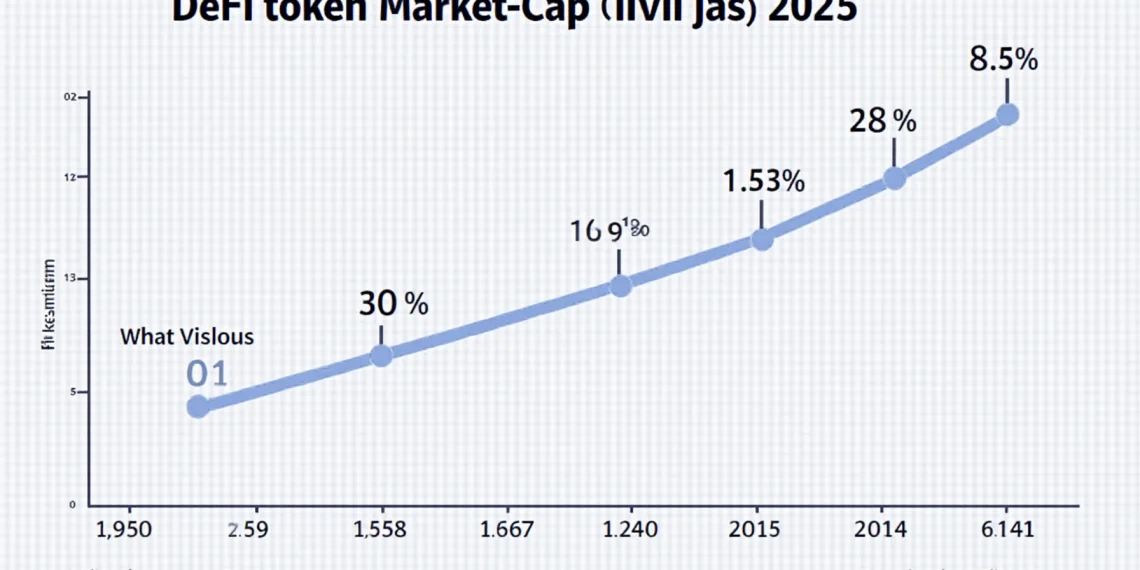<h2>Introduction</h2>
<p>With more than $4.1 billion lost to DeFi hacks in 2024, understanding the <strong>DeFi token market cap</strong> has never been more crucial for investors navigating this volatile landscape. Grasping how market capitalization reflects the health and potential of decentralized finance projects can empower you to make informed decisions as a cryptocurrency investor.</p>
<h2>What is DeFi Token Market Cap?</h2>
<p>The <strong>DeFi token market cap</strong> refers to the total value of a specific token within the decentralized finance ecosystem. It’s calculated by multiplying the current price of the token by its circulating supply. Imagine the market cap as a snapshot of a project‘s overall financial health. For instance, a token with a market cap of $1 billion suggests a strong interest and valuation in the market, similar to how a successful startup might be evaluated in the traditional business world.</p>
<h2>The Role of Market Capitalization in DeFi</h2>
<p>Market cap plays a pivotal role in assessing the <strong>DeFi token market cap</strong>. High market capitalization typically indicates a lower investment risk, whereas low market cap tokens can be more susceptible to volatility. <strong>In the context of Vietnam</strong>, where the crypto user growth rate is approximately 37% annually, understanding these dynamics becomes essential for local investors.</p>
<h3>Key Considerations for Investors</h3>
<ul>
<li>**Liquidity**: Tokens with higher market caps often have higher liquidity, making them easier to buy and sell.</li>
<li>**Potential Growth**: While low market cap tokens might offer higher growth potential, they can also come with increased risks.</li>
<li>**Ecosystem Adoption**: A strong ecosystem surrounding the token can bolster its market cap. Projects that integrate well with other DeFi platforms tend to perform better.</li>
</ul>
<h3>Analyzing DeFi Token Market Cap Trends</h3>
<p>To effectively analyze the <strong>DeFi token market cap</strong>, it‘s essential to track market trends over time. For instance, a steady increase in a token‘s market cap often indicates growing investor confidence, whereas sharp declines may signal potential issues within the project. For Vietnamese investors, staying updated on local market sentiment through platforms like <a href=“https://hibt.com“>hibt.com</a> can provide invaluable insights.</p>
<h2>Conclusion</h2>
<p>In conclusion, the <strong>DeFi token market cap</strong> is a critical indicator for investors looking to navigate the decentralized finance landscape. By understanding its implications and considering market trends, investors can make more informed decisions. As the Vietnamese crypto market continues to grow, keep an eye on innovative projects that can redefine investment strategies in this dynamic landscape. Remember, investing in cryptocurrencies carries risks—always conduct your due diligence.</p>
<p>Not financial advice. Consult local regulators.</p>
<p>Written by Dr. Benjamin Tran, a seasoned blockchain expert with over 15 publications in the field and a leader in the auditing of renowned DeFi projects.</p>
<p>With more than $4.1 billion lost to DeFi hacks in 2024, understanding the <strong>DeFi token market cap</strong> has never been more crucial for investors navigating this volatile landscape. Grasping how market capitalization reflects the health and potential of decentralized finance projects can empower you to make informed decisions as a cryptocurrency investor.</p>
<h2>What is DeFi Token Market Cap?</h2>
<p>The <strong>DeFi token market cap</strong> refers to the total value of a specific token within the decentralized finance ecosystem. It’s calculated by multiplying the current price of the token by its circulating supply. Imagine the market cap as a snapshot of a project‘s overall financial health. For instance, a token with a market cap of $1 billion suggests a strong interest and valuation in the market, similar to how a successful startup might be evaluated in the traditional business world.</p>
<h2>The Role of Market Capitalization in DeFi</h2>
<p>Market cap plays a pivotal role in assessing the <strong>DeFi token market cap</strong>. High market capitalization typically indicates a lower investment risk, whereas low market cap tokens can be more susceptible to volatility. <strong>In the context of Vietnam</strong>, where the crypto user growth rate is approximately 37% annually, understanding these dynamics becomes essential for local investors.</p>
<h3>Key Considerations for Investors</h3>
<ul>
<li>**Liquidity**: Tokens with higher market caps often have higher liquidity, making them easier to buy and sell.</li>
<li>**Potential Growth**: While low market cap tokens might offer higher growth potential, they can also come with increased risks.</li>
<li>**Ecosystem Adoption**: A strong ecosystem surrounding the token can bolster its market cap. Projects that integrate well with other DeFi platforms tend to perform better.</li>
</ul>
<h3>Analyzing DeFi Token Market Cap Trends</h3>
<p>To effectively analyze the <strong>DeFi token market cap</strong>, it‘s essential to track market trends over time. For instance, a steady increase in a token‘s market cap often indicates growing investor confidence, whereas sharp declines may signal potential issues within the project. For Vietnamese investors, staying updated on local market sentiment through platforms like <a href=“https://hibt.com“>hibt.com</a> can provide invaluable insights.</p>
<h2>Conclusion</h2>
<p>In conclusion, the <strong>DeFi token market cap</strong> is a critical indicator for investors looking to navigate the decentralized finance landscape. By understanding its implications and considering market trends, investors can make more informed decisions. As the Vietnamese crypto market continues to grow, keep an eye on innovative projects that can redefine investment strategies in this dynamic landscape. Remember, investing in cryptocurrencies carries risks—always conduct your due diligence.</p>
<p>Not financial advice. Consult local regulators.</p>
<p>Written by Dr. Benjamin Tran, a seasoned blockchain expert with over 15 publications in the field and a leader in the auditing of renowned DeFi projects.</p>

















